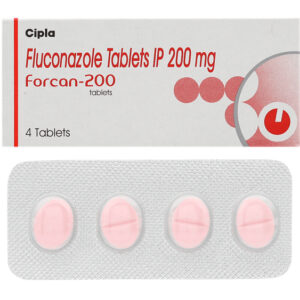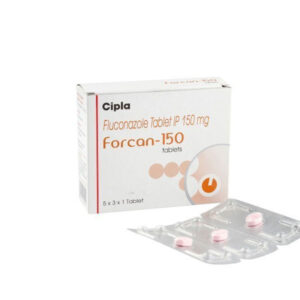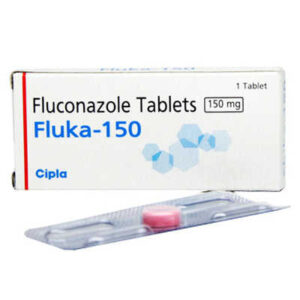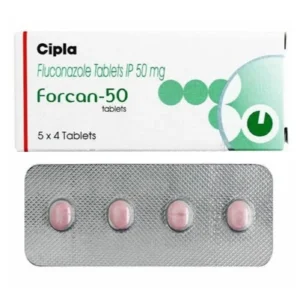Fluconazole
Showing all 4 results
What is Fluconazole?
Fluconazole is an antifungal medication that is used to treat and prevent a variety of fungal infections. It belongs to a class of drugs known as triazole antifungals and works by inhibiting the growth and reproduction of fungal cells.
Fluconazole is commonly prescribed to treat infections caused by Candida fungi, such as thrush, esophageal candidiasis, and invasive candidiasis. It is also used to prevent fungal infections in people with weakened immune systems, such as those with HIV/AIDS or undergoing chemotherapy.
Fluconazole is available in various forms, including oral tablets, capsules, and liquid, as well as an intravenous injection for severe infections. It is a prescription-only medication and should only be taken under the guidance of a healthcare professional.
Uses of Fluconazole
Fluconazole is primarily used to treat and prevent fungal infections caused by a variety of different types of fungi. Some of the most common uses of fluconazole include:
- Treatment of thrush: Fluconazole is often prescribed to treat thrush, a fungal infection of the mouth, throat, or tongue, which is commonly seen in people with weakened immune systems or those taking antibiotics.
- Treatment of vaginal yeast infections: Fluconazole is also used to treat vaginal yeast infections, which are caused by an overgrowth of the Candida fungus.
- Treatment of systemic fungal infections: Fluconazole is used to treat invasive fungal infections that affect the bloodstream, organs, and other parts of the body. These types of infections are often seen in people with weakened immune systems, such as those with HIV/AIDS or undergoing chemotherapy.
- Prevention of fungal infections: Fluconazole is also used to prevent fungal infections in people with weakened immune systems who are at high risk of developing such infections.
It is important to note that fluconazole should only be used under the guidance of a healthcare professional and should not be used to treat viral infections, such as the common cold or flu.
How to take Fluconazole
Fluconazole is available in various forms, including oral tablets, capsules, and liquid, as well as an intravenous injection for severe infections. The dosage and duration of treatment will depend on the type and severity of the fungal infection being treated, as well as the individual’s age, weight, and overall health.
Here are some general guidelines for taking fluconazole:
- Follow the dosage and administration instructions provided by your healthcare professional.
- Take fluconazole with or without food, as directed by your healthcare professional.
- Swallow the tablet or capsule whole with a glass of water. Do not crush, chew, or break the tablet or capsule.
- If you are taking the liquid form of fluconazole, use the provided measuring spoon or syringe to measure the correct dose.
- If you are receiving fluconazole by intravenous injection, it will be administered by a healthcare professional in a hospital or clinic setting.
- It is important to complete the full course of treatment, even if you start to feel better before the medication is finished.
- If you miss a dose, take it as soon as you remember. If it is almost time for your next dose, skip the missed dose and resume your regular dosing schedule.
It is important to talk to your healthcare professional if you have any questions or concerns about how to take fluconazole.
Side effects
Like any medication, fluconazole can cause side effects, although not everyone will experience them. Some common side effects of fluconazole include:
- Nausea and vomiting
- Headache
- Abdominal pain
- Diarrhea
- Dizziness
- Skin rash or itching
- Changes in taste
- Fatigue
- Muscle or joint pain
How does Fluconazole work?
Fluconazole works by inhibiting the growth and reproduction of fungal cells. It belongs to a class of drugs known as triazole antifungals, which work by inhibiting the activity of an enzyme called cytochrome P450 14α-demethylase, which is involved in the production of ergosterol, an essential component of the fungal cell membrane.
By inhibiting this enzyme, fluconazole disrupts the production of ergosterol, causing holes to develop in the fungal cell membrane. This disruption weakens the cell wall, making it more susceptible to damage and ultimately leading to the death of the fungal cells.
Fluconazole is effective against a wide range of fungal infections, including those caused by Candida and Cryptococcus fungi. It is able to penetrate into tissues and fluids throughout the body, allowing it to effectively treat infections in various parts of the body, including the bloodstream, organs, and other tissues.
It is important to note that fluconazole is a prescription medication and should only be taken under the guidance of a healthcare professional.





